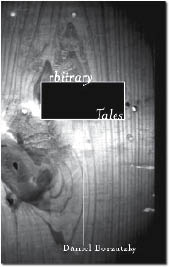Permutated Pasts: An Interview with Daniel Borzutzky
by Forrest Roth

Daniel Borzutzky, author of Arbitrary Tales (Triple Press) and the forthcoming The Ecstasy of Capitulation (BlazeVOX), will be appearing Thursday, February 1, at Medaille College for the COMMUNIQUE Flash Fiction series. The event is in conjunction with Medaille’s The Write Thing series, featuring poet Sara Greenslit that same evening, and will take place at the Huber Hall Library starting 7pm.
In a recent email interview I asked Borzutzky about his working philosophy behind Arbitrary Tales, which, despite what his title suggests, is anything but a collection of casual, inspired divergences: Think, instead, an almost fabulist mélange—one that appropriates history, various mythologies and dadaism into symbolic forms, slices of satirical drama, even contemporary parable.
Artvoice: After reading Arbitrary Tales, I’m not surprised you lived and taught in Istanbul, Turkey, at the crossroads (and a former point of conflict) between the East and West. Is it a mistake, however, to see the work here as allegorical of random cultural uncertainties, of binding our imagination to history so that order may be imposed on them?
Daniel Borzutzky: That’s a very interesting and helpful way of thinking about my work. I would say that more than trying to impose order on the cultural uncertainties, I see Arbitrary Tales as attempting to re-imagine some of those uncertainties, as attempting to tell as many different types of stories as possible, in different forms, voices and genres. I try to tell stories as historical allegories, as plays, as operas, as rituals, as untold stories, and to alter to my approach to language to match each structural attempt. As you imply in your question, I am very interested in the idea of hybridity, not just a hybridity of narrative form but of rhetorical voice, and historical content, as well.
AV: Do you think history should be addressed as linguistic ritual like mythology is? That is, former may be considered no more factual than the latter? Arbitrary Tales seems to perceive, recast history in “mutation and…morphology,” as Norman Lock says in praise of the book.
DB: The idea of history as linguistic ritual is fascinating, though I think beyond the scope of my project. I don’t see myself as trying to make any large statements about history, and I don’t think it’s right to say that history is no more factual than mythology. However, what your question correctly alludes to is my interest in imagining history, not to re-tell it from a different point of view, but rather to use language and narrative structures to build histories that have never happened. I certainly don’t think that history is constructed or narrated arbitrarily. On the contrary. However, having said that, perhaps I was interested in seeing what might happen if I imposed arbitrary narratives and ideas upon history.
AV: In one story you allude to “a language induced by punctures.” A few narratives play on this idea, particularly “Uncle Alberto in Exile,” in which every word begins with a vowel. The effect is quite conspicuous, but what would you like steady fiction readers to take from exercises such as this one?
DB: My hope is that the story goes beyond exercise and stands on its own as an actual story. But yes, you are correct to say that I am interested in exposing how the story gets told, and making that process clear to the reader. In “Uncle Alberto in Exile,” I wanted to take an extreme structural constraint and push it to its limits, yet at the same time I wanted to tell a coherent, logical story. Moreover, I wanted the structure of the story to correspond with its content. The story is about exile, and people who go into exile often experience a loss of language. Thus I wanted the language of the story to be limited so as to reflect the way an exiled person’s language might be limited.
AV: What can we expect in The Ecstasy of
Capitulation?
DB: The Ecstasy of Capitulation is extremely different from Arbitrary Tales. However, it might be useful to say that if in Arbitrary Tales I was interested in the many possible ways that stories might get told, then in The Ecstasy of Capitulation I am interested in the many possible ways that narratives get told through poems. There are poems that respond to articles in women’s magazines, to political speeches, to fairy tales; there are poems about torture, leek soup, government surveillance, Dick Cheney’s mistress, mutual funds, invented animals, love, exile, grammar, perinea, the stock market, and the Barbaric Writers, a group originally found in the work of Chilean writer Roberto Bolaño, and who commune with master works of literature by defecating and vomiting on them. For literature, to quote myself, is hard work; it is hard to create such filthy, vile putrescence.
|
Issue Navigation> Issue Index > v6n5: Who'll Stop the War? (2/1/07) > Permutated Pasts: An Interview with Daniel Borzutzky This Week's Issue • Artvoice Daily • Artvoice TV • Events Calendar • Classifieds |









 Current Issue
Current Issue